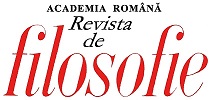Fidelitatea în filosofie: puțin despre cazul Aristotel
Fidelity in Philosophy: A Little about the Case of Aristotle
Author(s): Anton AdămuțSubject(s): Ancient Philosphy
Published by: Editura Academiei Române
Keywords: Plato; Aristotle; Augustine; Tertullian; Ideas; theory of Ideas; philosophy; complementarity;
Summary/Abstract: A long debate lasted between Aristotle and Plato. One can say that, despite the critique of the theory of ideas, the main interest of Antiquity was to read both authors in a harmonic relation. In Late Antiquity and during the Middle Ages, Peripatetic and Neoplatonist schools, despite the differences between them, are only two examples of such reading. Greek philosophy ends in negation (with the sceptic philosophy) and mystics (with the Neoplatonic school). Saint Augustin, an important participant to the debate, continues the Neoplatonic perspective and will use it as a ground for a new kind of certainty: the existence of God. The end of the dispute: In Parmenides, Plato refers his theory of ideas both to the Parmenidian and to the Heraclitean philosophies. Aristotle will say that Plato is close to Parmenides when he talks about intelligible things and close to Heraclitus when he talks about sensible things. In sum, after reading Aristotle, we can thus explain Plato’s philosophy: Following Parmenides, Ideas have an existence, but not reality and, following Heraclitus, sensible things have reality, but not an existence.
Journal: Revista de filosofie
- Issue Year: LXX/2023
- Issue No: 2
- Page Range: 137-146
- Page Count: 10
- Language: Romanian

